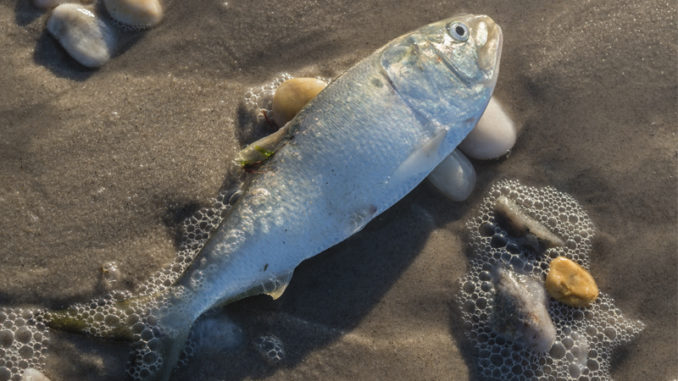
Menhaden bill moves forward
On June 2, HB 535, a bill that would create exclusion zones along the Louisiana coast where the commercial harvest of menhaden would be prohibited, moved forward from the Senate Committee on Natural Resources to the Legislative Bureau, where it will be reviewed before it is debated on the Senate floor.
The Louisiana House of Representatives passed HB 535 in a 67-28 vote on May 19. If the Senate passes the bill, it will go to the governor’s desk, where it could be signed into law.
Supporters praise HB 535 as a necessary protection for Louisiana’s surf zones against potential ecological threats posed by the menhaden industry, while opponents contend that the bill will cost Louisiana jobs and millions of dollars in revenue, calling HB 535 “a solution waiting for a problem.”
“This is a Louisiana issue,” said David Cresson, the CEO of the Coastal Conservation Association-Louisiana and a supporter of the measure. “When we’re talking about 90% of the catch coming from Louisiana waters, it’s a Louisiana issue. We are the only state in the Gulf that does not have a buffer zone against this style of fishing.”
Alabama, Mississippi and Texas have enacted regulations that limit where menhaden may be harvested. And Florida does not allow commercial menhaden operations anywhere in its waters.
“No matter what you believe the by-catch is, whether it’s less than 1%, or a couple of percent, you’re still talking about millions of pounds of by-catch,” Cresson said.
Shore birds would potentially benefit from the bill
Brent Newman, policy director at Audubon Delta, spoke in favor of HB 535.
“We believe that a regulated commercial fishery can maintain its role as an economic engine along the coast with these common-sense regulations….” he said. “We think that these (regulations) balance the impact of industry practice on the fishery, while protecting the recreational access to the resource and our coasts. And from the Audubon’s perspective, of course, bird habitat.”
Asked whether menhaden industry practices are harming the coast, Newman said:
“I think that if you were to advance a more ecosystem-based approach, where you take into account the impacts to the coasts, the impacts to shoreline birds, the impacts to the fisheries, you would find that impact.”
Chris Macaluso, marine fisheries director for the Theodore Roosevelt Conservation Partnership, also spoke in favor of the bill.
“I’ve been fishing within 50 yards of those beaches (of Terrebonne Parish) and had the pogey boats come within 100 yards of me and set their nets,” Macaluso said, “and it’s not a pleasant experience to see the dead pogeys and dead redfish and dead jacks and other fish that are left behind.”
“This is not just a conflict between user groups,” he said. “There is a biological concern. It’s estimated that nearly 1 billion pounds of pogeys are harvested annually off Louisiana’s coast, (resulting in) 30 to 50 million pounds of unintended catch, much of it, other food sources for sportfish.
“If the pogey boats are in the same place where speckled trout and redfish are being caught,” said Macaluso, “(they) are being killed in the nets. The trout and redfish are there to spawn during the summer. They’re there eating pogeys.”
Opponents say the bill is unnecessary
Ben Landry, an opponent of HB 535, spoke on behalf of Omega Protein, which operates 25 menhaden-fishing vessels in the Gulf of Mexico and two processing facilities in Louisiana, dismissing charges that the menhaden industry’s by-catch is a problem.
Referencing the findings of what he described as “a lengthy and expensive project conducted in the 1990s,” Landry told lawmakers that the percentage of by-catch is much lower than the 2% usually attributed to the menhaden industry, and that the figure was roughly 1% back when the industry had more facilities in the Gulf.
“The National Marine Fisheries Service deemed (industry by-catch) insignificant by their determination,” Landry said. “And after (the study), the (menhaden) industry, at its own expense, put millions of dollars’ worth of equipment on our vessels to further reduce by-catch from that 1%, including shark guards, which are put at the top of the vacuum hose, as well as excluder screens to protect larger fish, primarily larger predators, like sharks, redfish, and speckled trout.”
Bill will move to Senate floor before final vote
“When compared to other commercial sectors,” he said, “or even ‘discard mortality’ by recreational anglers, we’re roughly in line with (them), and in the case of the commercial fisheries, (our by-catch is) dramatically less.”
Patrick Banks, assistant secretary with the Louisiana Department of Wildlife and Fisheries’ Office of Fisheries, said that the only ecosystem look that he is aware of occurred when the menhaden fishery received its Marine Stewardship Council certification as a Sustainable Fishery, which is only awarded after the successful completion of an ecosystem evaluation.
“I would remind the committee that the surf zone is an extremely violent zone already,” Banks said. “If these species could not deal with a turbulent, constantly changing zone, that’s not where their life history would have taken them to spawn.”
After it is reviewed by the Legislative Bureau, HB 535 will proceed to the Senate floor, where it will be debated before a final vote is taken.
If you would like to stream yesterday’s Natural Resources Committee meeting in full, visit https://senate.la.gov/s_video/videoarchive.asp?v=senate/2021/06/060121NATR.


